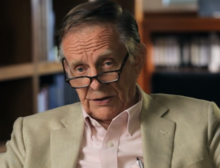
Mormons are a religious and cultural group related to Mormonism, the principal branch of the Latter Day Saint movement started by Joseph Smith in upstate New York during the 1820s. After Smith's death in 1844, the movement split into several groups following different leaders; the majority followed Brigham Young, while smaller groups followed Joseph Smith III, Sidney Rigdon, and James Strang. Most of these smaller groups eventually merged into the Community of Christ, and the term Mormon typically refers to members of the Church of Jesus Christ of Latter-day Saints, as today, this branch is far larger than all the others combined. People who identify as Mormons may also be independently religious, secular, and non-practicing or belong to other denominations. Since 2018, the LDS Church has emphasized a desire for its members be referred to as "members of The Church of Jesus Christ of Latter-day Saints", or more simply as "Latter-day Saints".

Mormonism is the theology and religious tradition of the Latter Day Saint movement of Restorationist Christianity started by Joseph Smith in Western New York in the 1820s and 1830s. As a label, Mormonism has been applied to various aspects of the Latter Day Saint movement, although since 2018 there has been a push from The Church of Jesus Christ of Latter-Day Saints to distance themselves from this label. A historian, Sydney E. Ahlstrom, wrote in 1982 that, depending on the context, the term Mormonism could refer to “a sect, a mystery cult, a new religion, a church, a people, a nation, or an American subculture; indeed, at different times and places it is all of these."
In Mormonism, the restoration refers to a return of the authentic priesthood power, spiritual gifts, ordinances, living prophets and revelation of the primitive Church of Christ after a long period of apostasy. While in some contexts the term may also refer to the early history of Mormonism, in other contexts the term is used in a way to include the time that has elapsed from the church's earliest beginnings until the present day. Especially in the Church of Jesus Christ of Latter-day Saints "the restoration" is often used also as a term to encompass the corpus of religious messages from its general leaders down to the present.

In to the Book of Mormon, the Liahona is a brass ball with two spindles, one of which directs where Lehi and his companions should travel after they leave Jerusalem at the beginning of the narrative. Some early participants in the Latter Day Saint movement, believing contrary to mainstream findings that the Book of Mormon described genuinely historical events, claimed to have seen the Liahona. The Church of Jesus Christ of Latter-day Saints and its members have used the Liahona as a namesake, such as in the name of the magazine the Liahona and in the idea of "Liahona Mormons".
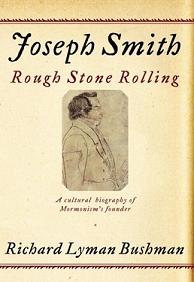
Joseph Smith: Rough Stone Rolling: A Cultural Biography of Mormonism's Founder is a biography of Joseph Smith, founder and prophet of the Latter Day Saint movement, by historian Richard Bushman. Bushman is both a practicing member of The Church of Jesus Christ of Latter-day Saints and the Gouverneur Morris Professor of History emeritus at Columbia University. Rough Stone Rolling received the 2005 Best Book Award from the Mormon History Association and the 2005 Evans Biography Award from the Mountain West Center for Regional Studies.
Historians of the Latter Day Saint movement are a diverse group of historians writing about Mormonism. Historians devoted to the history of the Latter Day Saint movement may be members of a Latter Day Saint faith or non-members with an academic interest. They range from faith-promoting historians to anti-Mormon historians, but also include scholars who make an honest effort at objectivity.

Jo Ann Barnett Shipps, known as Jan Shipps, is an American historian specializing in Mormon history, particularly in the latter half of the 20th century to the present. Shipps is generally regarded as the foremost non-Mormon scholar of the Latter Day Saint movement, having given particular attention to the Church of Jesus Christ of Latter-day Saints. Her first book on the subject was Mormonism: The Story of a New Religious Tradition published by the University of Illinois Press. In 2000, the University of Illinois Press published her book Sojourner in the Promised Land: Forty Years Among the Mormons, in which she interweaves her own history of Mormon-watching with 16 essays on Mormon history and culture.

No Man Knows My History: The Life of Joseph Smith is a 1945 book by Fawn M. Brodie that was one of the first significant non-hagiographic biographies of Joseph Smith, the progenitor of the Latter Day Saint movement. No Man Knows My History was influential in the development of Mormon history as a scholarly field. However, scholars have since criticized the book for its methodological deficiencies, factual errors, and overt hostility to Smith.

View of the Hebrews is an 1823 book written by Ethan Smith, a Congregationalist minister in Vermont, who argued that Native Americans were descended from the Ten Lost Tribes of Israel, a relatively common view during the early nineteenth century. Numerous commentators on Mormon history, from LDS Church general authority B. H. Roberts to Fawn M. Brodie, biographer of Joseph Smith, have noted similarities in the content of View of the Hebrews and the Book of Mormon, which was first published in 1830, seven years after Ethan Smith's book.
The teachings of Joseph Smith include a broad spectrum of religious doctrines as well as political and scientific ideas and theories, many of which he said were revealed to him by God. Joseph Smith is the founder of the Latter Day Saint movement and is recognized by multiple Latter Day Saint churches as the founder. Beginning in 1828, Smith began dictating the text of what later became the Book of Mormon, and also began dictating written revelations he said were inspired by God.
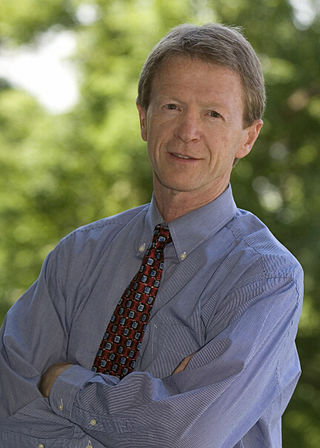
Philip Layton Barlow is a Harvard-trained scholar who specializes in American religious history, religious geography, and Mormonism. In 2019, Barlow was appointed associate director of the Neal A. Maxwell Institute for Religious Scholarship. Barlow was the first full-time professor of Mormon studies at a secular university as the inaugural Leonard J. Arrington Chair of Mormon History and Culture at Utah State University (USU), from 2007 to 2018.
New Mormon history refers to a style of reporting the history of Mormonism by both Mormon and non-Mormon scholars which departs from earlier more polemical or faith-based styles of history. Rather than presenting material selectively to either prove or disprove Mormonism, the focus of new Mormon history is to present history in a more humanistic and dispassionate way, and to situate Mormon history in a fuller historical context. Because it is a break from past historical narratives, new Mormon history tends to be revisionist. In many cases, the new Mormon history follows the perspectives and techniques of new history, including cultural history. The Mormon historian Richard Bushman described it as "a quest for identity rather than a quest for authority." New Mormon historians include a wide range of both Mormon and non-Mormon scholars, the most prominent of which include Bushman, Jan Shipps, D. Michael Quinn, Terryl Givens, Leonard J. Arrington, Richard P. Howard, Fawn Brodie, and Juanita Brooks.
In the Book of Mormon, Zenock is a prophet who predates the events of the book's main plot and whose prophecies and statements are recorded upon brass plates possessed by the Nephites. Nephite prophets quote or paraphrase Zenock several times in the course of the narrative.
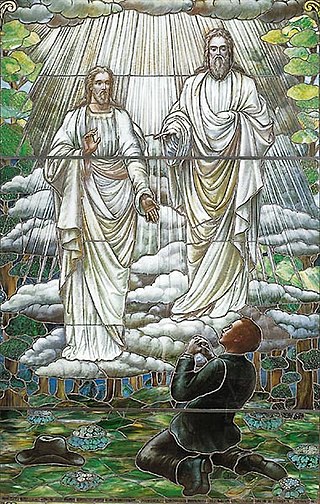
Mormonism and Nicene Christianity have a complex theological, historical, and sociological relationship. Mormons express their doctrines using biblical terminology. They have similar views about the nature of Jesus Christ's atonement, bodily resurrection, and Second Coming as mainstream Christians. Nevertheless, most Mormons do not accept the doctrine of the Trinity as codified in the Nicene Creed of 325 and the Nicene-Constantinopolitan Creed of 381. Although Mormons consider the Protestant Bible to be holy scripture, they do not believe in biblical inerrancy. They have also adopted additional scriptures that they believe to have been divinely revealed to Joseph Smith, including the Book of Mormon, the Doctrine and Covenants, and the Pearl of Great Price. Mormons practice baptism and celebrate the sacrament of the Lord's Supper, but they also participate in other religious rituals. Mormons self-identify as Christians.
Mormon studies is the interdisciplinary academic study of the beliefs, practices, history and culture of individuals and denominations belonging to the Latter Day Saint movement, a religious movement associated with the Book of Mormon, though not all churches and members of the Latter Day Saint movement identify with the terms Mormon or Mormonism. Denominations of the Latter Day Saint movement include the Church of Jesus Christ of Latter-day Saints, by far the largest, as well as the Community of Christ (CoC) and other smaller groups, include some categorized under the umbrella term Mormon fundamentalism.
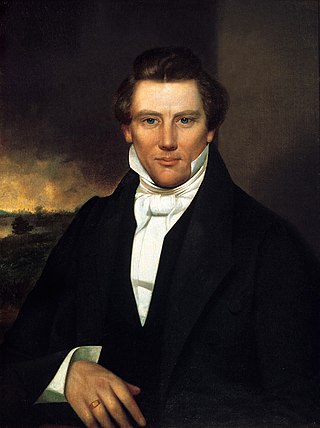
Joseph Smith Jr. was an American religious leader and the founder of Mormonism and the Latter Day Saint movement. Publishing the Book of Mormon at the age of 24, Smith attracted tens of thousands of followers by the time of his death fourteen years later. The religion he founded is followed to the present day by millions of global adherents and several churches, the largest of which is the Church of Jesus Christ of Latter-day Saints.
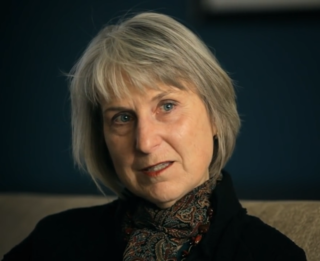
Kathleen Flake is an American historian, writer, and attorney and is currently the Richard Lyman Bushman chair of Mormon studies at the University of Virginia.
Reid Larkin Neilson is the assistant academic vice president (AAVP) for religious scholarly publications at Brigham Young University (BYU). He was the Assistant Church Historian and Recorder for the Church of Jesus Christ of Latter-day Saints from 2015 to 2019, and the managing director of the church's history department from 2010 to 2019.
This is a bibliography of works on the Latter Day Saint movement.
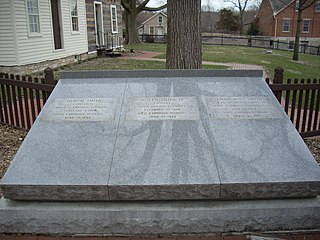
The legacy of Joseph Smith includes the immediate aftermath of Smith's killing, among various competing denominations, the status of his family and the church he founded, and a scholarly assessment of his life and religion. Although Smith was killed in 1844, he attracted thousands of devoted followers before his death, and millions in the century that followed. Among Mormons, he is generally regarded as a prophet on par with Moses and Elijah. In a 2015 compilation of the 100 Most Significant Americans of All Time, Smithsonian magazine ranked Smith first in the category of religious figures.
